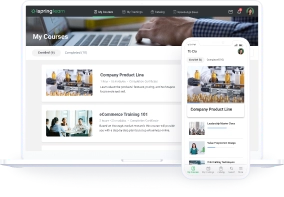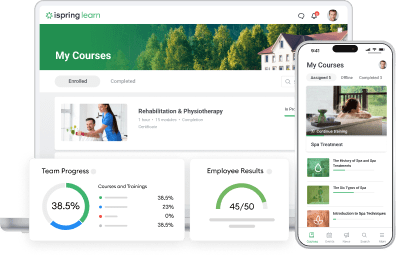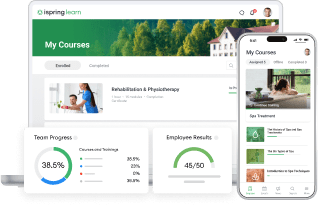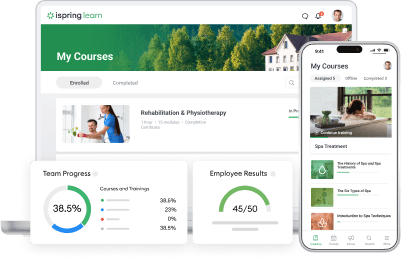7 Learning Management Systems For Small Business

According to a ManpowerGroup Global Talent Shortage 2025 report, 74% of employers claimed that finding the skilled talent they need is challenging. Also, employee resistance to change remains a common problem. The good news is that you can address both challenges with a single solution — a learning management system (LMS). The right platform will help you stay on top of employee training needs. All you need to do is find the best LMS for a small business that will fit yours perfectly.
Read on to see the list of the best LMS platforms for small businesses and discover how to choose the right learning software from all options.
Why Do Small Businesses Need a Learning Management System?
Enterprise-level companies often use learning management systems because they make training management easier. Purchasing an LMS for small businesses might seem unnecessary. However, the reality is that small businesses face the same challenges as the big ones when it comes to employee training:
- A high level of resistance from long-term employees leads to a delay in their skill development.
- Poor engagement leads to a reduction in training efficiency and can sometimes touch off employee attrition.
- Training expenses keep growing while employees’ skill development progresses slowly.
- As the business grows, it becomes more difficult to keep learning materials relevant for new employees.
Fortunately, all these risks can be easily mitigated with learning management systems.
Enhanced employee engagement and greater retention
Today, over 51% of employees believe that training and learning something new gives them more self-confidence. This is particularly true about the youngest generations: around 35% of Gen Z expect their employer to offer them career development opportunities. Learning management systems can provide employees with unique individual learning programs for consistent training and certification.
Cost-effective employee training
Onboarding each new employee individually requires a great deal of money and effort. Using LMSs, you can make an induction program for each job position once and have it automatically assigned to new arrivals.
Scalability and flexibility
The knowledge base used by an LMS helps keep all company materials archived. And when you progressively onboard more and more employees, the best LMS for small businesses should be able to scale easily.
Better compliance
LMSs offer all this in one place, from flexible reports based on a wide range of criteria to detailed AI-powered analytics on an employee’s performance. Reports are usually available on the platform, and you can also schedule them to be emailed, which makes it much easier to understand your learners’ level of knowledge and always stay updated on their progress.
Small Business LMS Trends to Keep in Mind
Mobile learning over desktop
According to Priori Data research, over 81.6% of the US population use smartphones, with an even greater rate among young adults aged 18 to 29 (94%). As mobile devices penetrate deeper into our lives, over 70% of learners prefer using mobile devices for eLearning. This is why it is vital to choose the best LMS platform that will enable you to create mobile-accessible courses.
Gamification for engagement
It was proved that 89% of employees prefer gamified workplaces and learning. These numbers keep growing as millennials and Gen Z command a large portion of today’s workforce. The more customization and gamification you offer, the more engagement you get, keeping the employee retention rate high.
Data-driven training and insights
The GrowLearnConnect platform claims that learner history analysis is vital when you want to get more insights into how to organize your future learning efficiently. To ensure that team members have the knowledge and skills necessary to perform the tasks assigned to them, assess the LMS data routine.
AI-powered automation
Today, over 80% of managers automate their workflow to make it faster. The same holds for HR and learning management systems. Help from AI tools that are available in most learning management systems enables admins and trainers to create courses faster and with consideration to all the individual needs of the learners.
Personalized learning paths
Personalized learning provides more engagement and greater efficiency in studying. Academic research results show that 75% of students are motivated when the course is personalized, compared to 30% in regular classrooms. This is the same for employee and partner training.
The top 7 learning management systems (LMS) for small businesses
Now that you know what to keep in mind when choosing a corporate LMS for small businesses, let’s look at specific solutions and compare them.
1. iSpring Learn
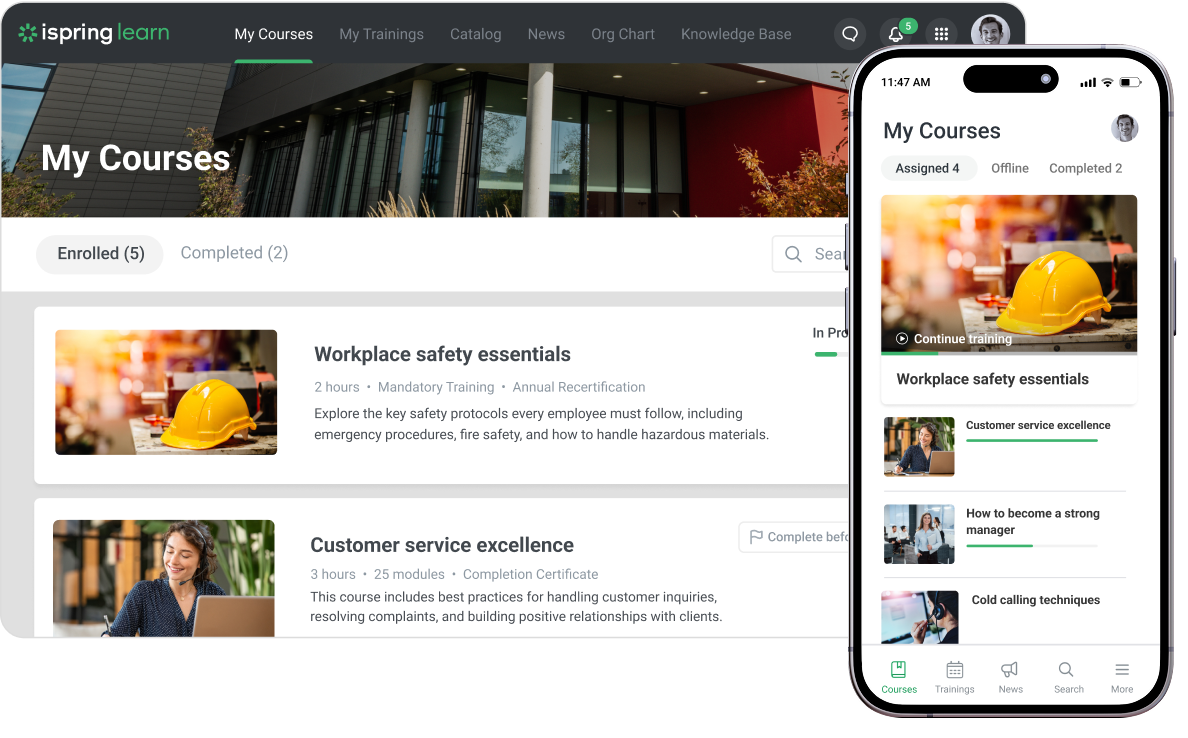
iSpring Learn boasts a user-friendly interface and allows learners to access courses, training sessions, and knowledge bases with a single click.
iSpring Learn is a powerful LMS for small businesses that provides top-quality learning experiences to users while also helping trainers manage the entire employee training cycle, which includes gathering reports and assessing results. It also boasts gamification and allows the creation of an online learning community. Here are the key reasons why iSpring Learn is the right choice:
- Course creation. The built-in course creation tool allows you to break content into chapters, create lists, add quotes and other blocks for engagement, and make quizzes.
- Knowledge assessment and performance reviews. iSpring Learn offers a powerful employee performance appraisal tool and is tailored to generate comprehensive reports on your employees’ success to provide a thorough assessment of their results.
- New hire onboarding. iSpring Learn offers several options for onboarding new employees: from a general onboarding program for all to individual courses and learning tracks that include a series of courses and VILT (virtual instructor-led training) sessions.
- Certification. You can create separate partner training programs with iSpring Learn and set up the platform to automatically issue certificates of completion to your partners when they finish each course.
- Knowledge base. The platform includes a knowledge base where you and your colleagues can create articles, categorize content, and upload relevant materials. Customizable user access also helps to provide learners with all necessary information.
Pricing
Flexible prices for this software begin at $3.70 per user per month (if billed annually) for the Start plan. For this price, you get a wealth of features, including access to the iSpring Suite authoring tool and 24/7 customer support via phone, chat, and email.
Our evaluation of the LMS
| Course creation | Knowledge assessment | Performance reviews | New hire onboarding | Certification | Knowledge base | Ease of implementation |
| 10 | 9 | 5 | 8 | 10 | 9 | 10 |
Overall score: 61
iSpring Learn LMS
Automate corporate training methods and improve employee performance.
2. TalentLMS
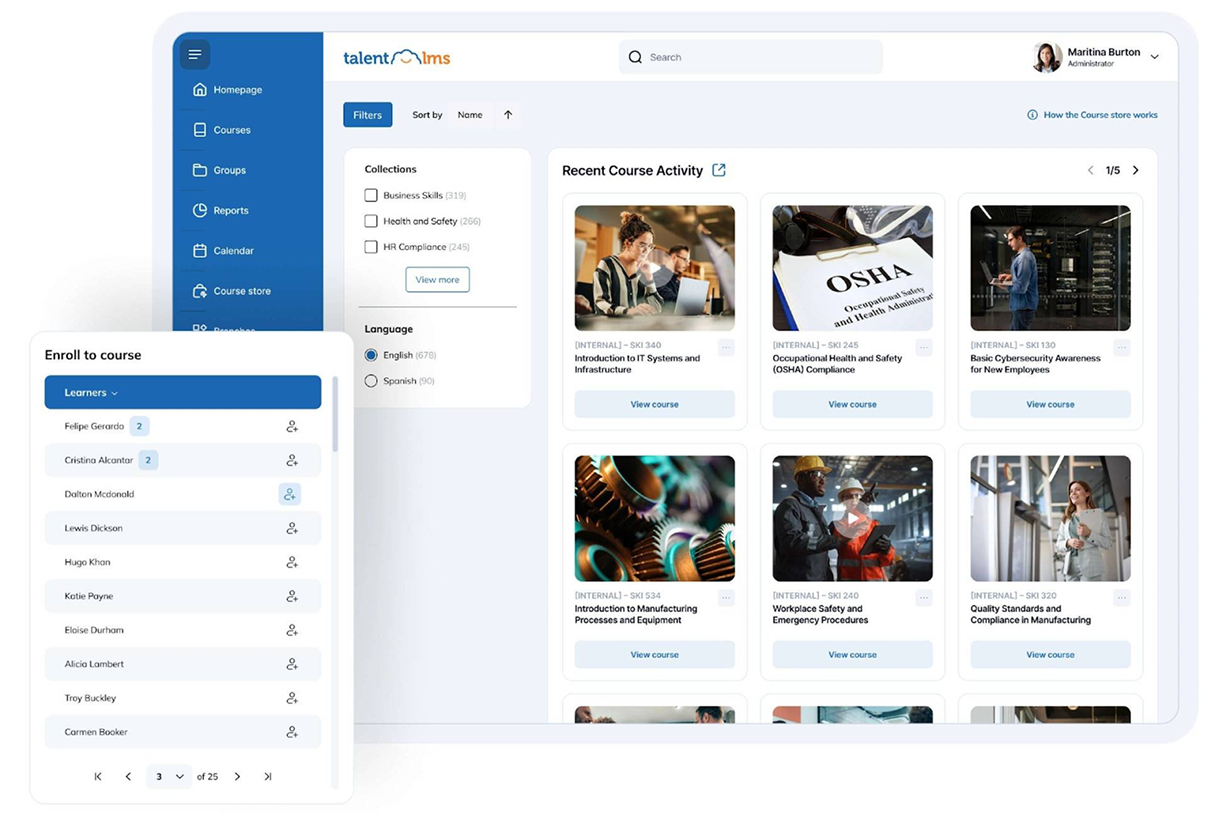
TalentLMS provides a convenient search of units and the simple creation of new courses.
TalentLMS provides tools for building and delivering training courses, monitoring learner results, and more. Plus, there’s a paid course library with ready-made courses. Let’s see why businesses choose TalentLMS:
- Course creation. The platform allows for the development of interactive courses via its built-in, intuitive course editor with ready-made templates or creation from scratch. An AI-powered tool for even easier content creation is also available.
- Knowledge assessment. The learning management system has a built-in tool for assessment through testing that helps you to easily keep track of your employees’ performance.
- New hire onboarding. TalentLMS allows you to create different training methods and programs, including compliance training and onboarding courses. As with iSpring Learn, you can put together an automated onboarding program for your new hires.
- Certification. With this platform, you can award your partners with customized certificates each time they complete training. Additionally, you can set expiration dates for your certificates.
Pricing
The platform offers six pricing options that range from a minimum functionality plan to Premium and Enterprise plans. It starts at $109 per month with basic TalentCraft AI features and $229 per month with the premium TalentCraft version included.
Our evaluation of the LMS
| Course creation | Knowledge assessment | Performance reviews | New hire onboarding | Certification | Knowledge base | Ease of implementation |
| 8 | 7 | 0 | 8 | 10 | 0 | 10 |
Overall score: 43
Also read: A Credible Alternative to TalentLMS – iSpring Learn
3. LearnWorlds
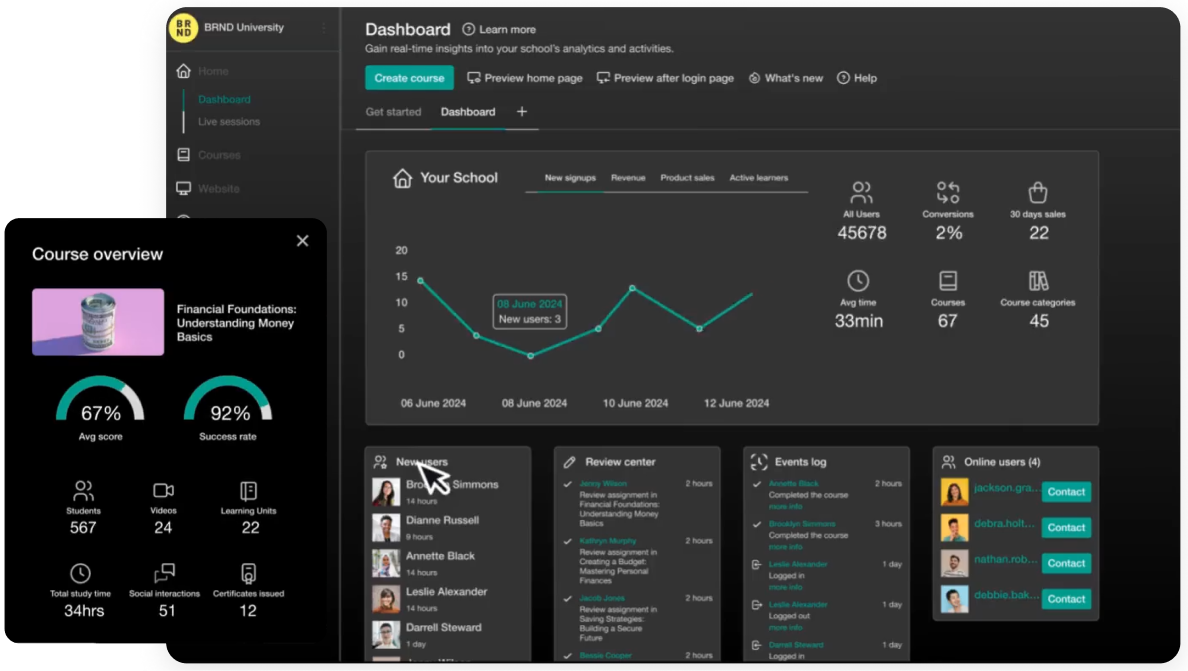
LearnWorlds is a popular learning management system that offers the creation of extremely engaging content. It promises appealing and effective training for employee skill development. As the solution was built to be a good fit for both SMBs and enterprises, it offers a wide variety of opportunities:
- Course creation. The tool allows users to create a variety of courses, from free to private, that include interactive videos, ebooks, 1:1 and group sessions, and more. The AI-powered assistant helps users generate interactive courses from simple text input.
- Knowledge assessment and performance reviews. You can build personalized exams and self-assessments on the platform and then present results to learners on a customizable summary screen.
- New hire onboarding. While not offering specific onboarding programs, this solution provides role-based access that keeps new hires within their assigned area; these can be created separately on the platform.
- Certification. The platform offers a gradebook for grading your learners. You can also provide personalized branded certificates featuring user or school name, exam scores, or previous submissions.
- Knowledge base. Though the platform doesn’t offer a ready-to-use knowledge base, you can build your own easily.
Pricing
Starting from €24 per month, you can create courses, websites, and more with 1 admin. To assign 5 admins, the Pro Trainer plan for €79 per month is needed. The biggest standard plan for now is a Learning Center plan for €249 per month that includes maximum functionality. The cost of larger enterprise plans is available upon request.
Our evaluation of the LMS
| Guideline creation | Knowledge assessment | Performance reviews | New hire onboarding | Certification | Knowledge base | Ease of implementation |
| 9 | 7 | 6 | 6 | 6 | 3 | 10 |
Overall score: 47
4. 360Learning
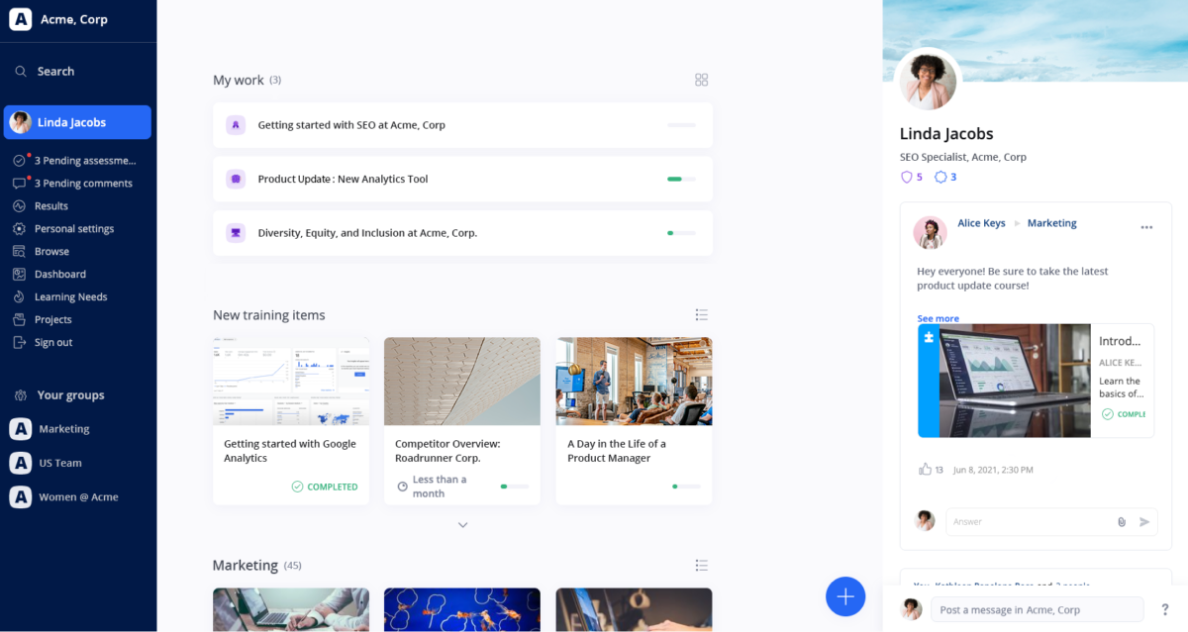
360Learning is another user-friendly LMS for small businesses that offers AI-powered tools and allows you to add integrations and make use of collaboration features. Here’s what small companies find attractive when considering the tool:
- Course creation. An AI-driven collaborative authoring tool helps import your existing documents and add new tasks. The platform also provides pre-designed course templates.
- Knowledge assessment and performance reviews. The learning management system offers many options, from using quizzes with 10+ question types to including video pitches and screencast demos that learners can record and upload to the platform.
- New hire onboarding. You can easily manage new enrollments by synchronizing employee data with the HR department and creating specific cohorts within a single workspace. Creating customized learning paths and leveraging blended learning capabilities are also available.
- Certification. The system allows you to add a custom certificate block to both learning paths and individual programs.
- Knowledge base. This LMS solution doesn’t allow users to create a knowledge base section. However, all users have their own reference section, which contains all documents seen by a user on the platform.
Pricing
The Team plan is for small companies with up to 100 people in need of training. With this plan, you pay $8 per month for each active user, which might seem reasonable if you have very few employees. But when there actually are a hundred trainees, the price doesn’t look as attractive.
Our evaluation of the LMS
| Guideline creation | Knowledge assessment | Performance reviews | New hire onboarding | Certification | Knowledge base | Ease of implementation |
| 8 | 7 | 5 | 8 | 10 | 3 | 10 |
Overall score: 51
5. Litmos
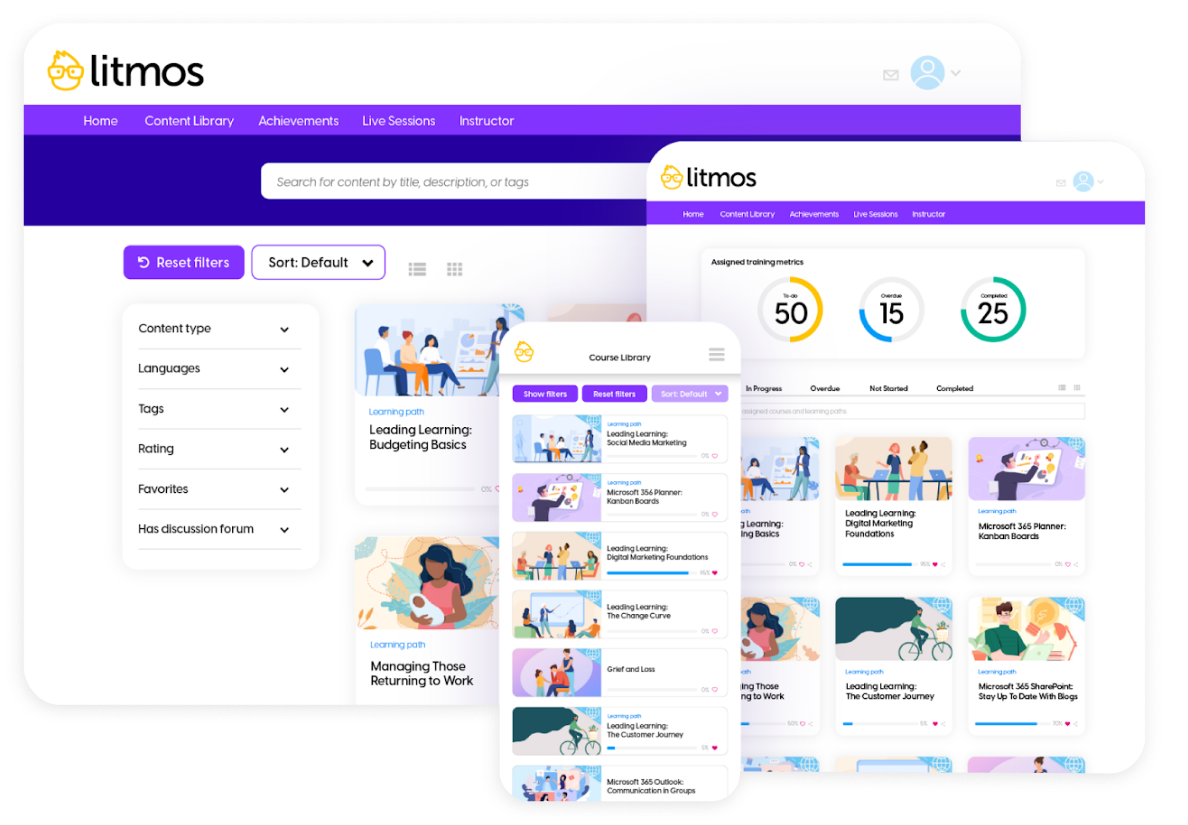
Litmos presents itself as an award-winning learning management system that unifies virtual, classroom, mobile, and collaborative learning and offers robust features, such as course authoring, automation, gamification, and more. Let’s see what it offers:
- Course creation. The system features a built-in content authoring tool, which allows you to create SCORM courses right on the platform. Different components like texts, pictures, headings, media, etc., are available as well.
- Knowledge assessment and performance reviews. The tool provides a wide range of quiz settings and video assessments. You can set a specific weighted value for each question, decide if you want to show feedback information, and enable answer hints. At the same time, your employees can submit completed video assignments for AI assessment.
- New hire onboarding. With Litmos, you can build comprehensive learning programs for your new employees by stringing multiple online courses together in logical sequences known as customized learning paths.
- Certification. This learning management system allows you to add a certificate to any course or learning path to be issued to the learner as a PDF upon successful completion. You can also choose a ready-made template or upload your own.
- Knowledge base. There’s no separate knowledge base section. Instead, you can add content to the Additional Documents section if you need to add any materials beyond the courses that learners are enrolled in.
Pricing
This LMS for small businesses comes with three pricing plans — Foundation, Premier, and Platinum Suites — that each offer a different set of features. Prices are only available upon request. There is also a free trial option to test the waters.
Our evaluation of the LMS
| Course creation | Knowledge assessment | Performance reviews | New hire onboarding | Certification | Knowledge base | Ease of implementation |
| 7 | 10 | 0 | 8 | 10 | 5 | 8 |
Overall score: 48
6. Absorb LMS
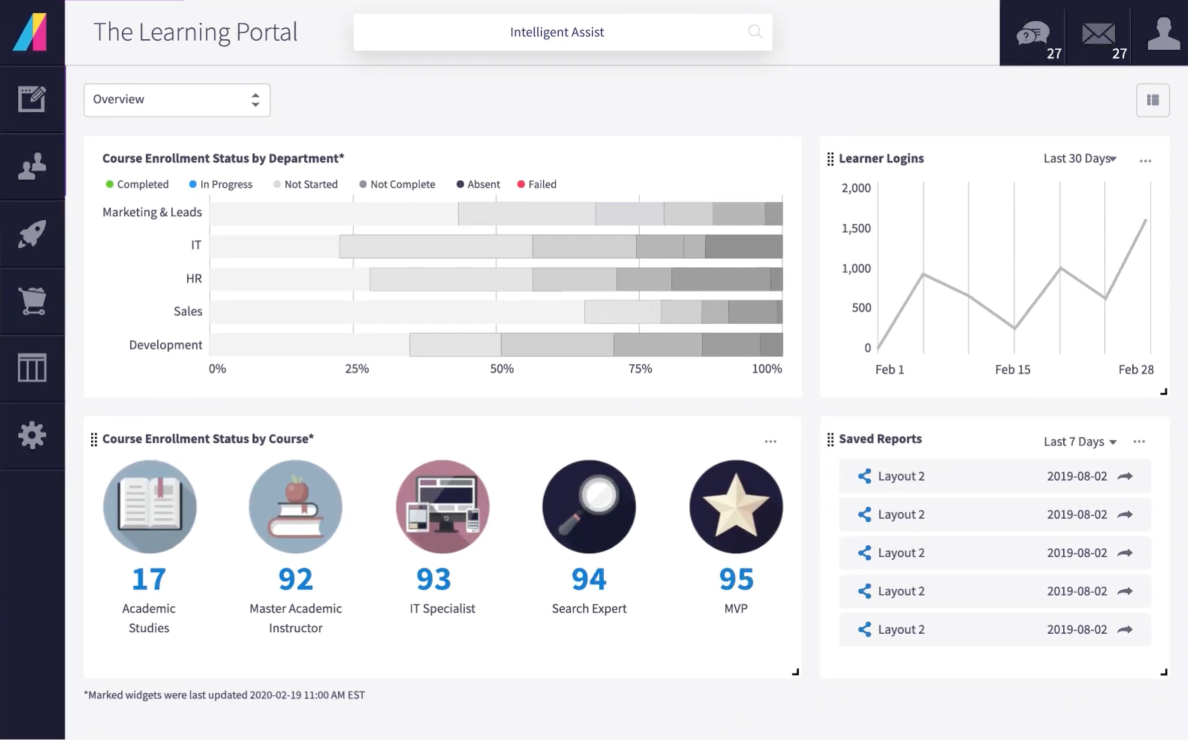
Absorb LMS is an AI-powered learning management system that promises to bridge knowledge gaps quickly, great onboarding, and more opportunities for learners and trainers. This solution became popular thanks to a wide range of opportunities for small businesses:
- Course creation. Absorb LMS allows for the creation of personalized learning courses. The solution offers Absorb Create AI to simplify the course-building experience, including the design and structure of the courses.
- Knowledge assessment and performance reviews. Though there are no specific knowledge assessment tools on the platform, it offers social learning that helps the admin analyze this feedback and provide tailored recommendations.
- New hire onboarding. The platform offers efficient onboarding with integrated pre-boarding content, mobile access for on-the-go learning, and more. The solution team claims they can reduce onboarding time by 40%.
- Certification. You can create certificates with custom user fields on the platform and automate their renewal.
- Knowledge base. This solution offers several content libraries, thanks to integrations with MedTrainer, Traliant, and HSI, so most of the topics can be covered with existing materials. However, you can always upload your own.
Pricing
This solution offers access-based pricing (pay only for what you use). There are several plans based on the number of active learners. Each plan includes onboarding features and staff training. However, you need to contact them to get exact prices for these plans.
Our evaluation of the LMS
| Course creation | Knowledge assessment | Performance reviews | New hire onboarding | Certification | Knowledge base | Ease of implementation |
| 9 | 4 | 5 | 9 | 8 | 10 | 9 |
Overall score: 45
7. SkyPrep
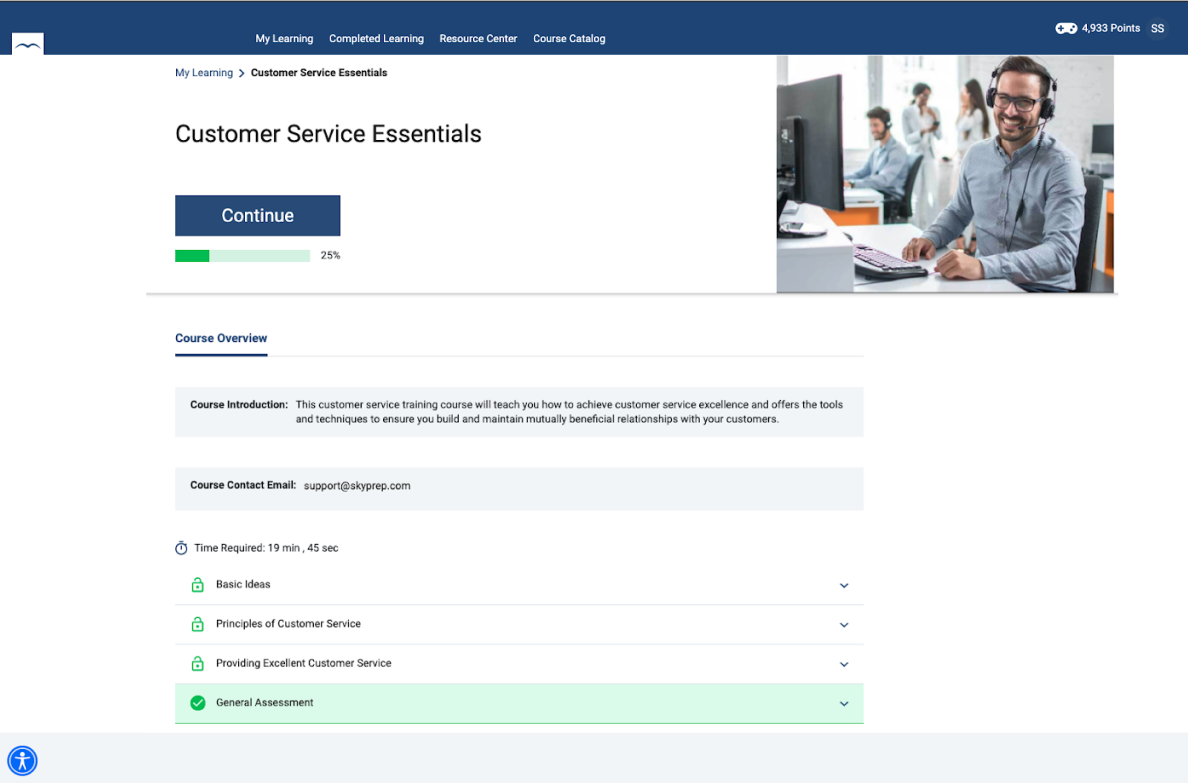
SkyPrep is an easy-to-use learning platform. The LMS features all the essential functionality needed for employee training: course authoring, delivery tools, and more. Companies choose SkyPrep for the many capabilities it offers:
- Course creation. The learning management system allows you to create interactive learning content from various content blocks. Finished content can then be published as a SCORM file and downloaded.
- Knowledge assessment and performance reviews. The platform also features a quiz-making tool, which enables you to set individual point values and see detailed analytics.
- New hire onboarding. Multiple courses can be combined in learning paths, so you can build an onboarding and compliance training program for all your new hires.
- Certification. You can award your learners with a certificate of completion after they finish a course or an entire learning path. Your customized certificate and the default template are both available.
- Knowledge base. SkyPrep LMS software doesn’t have a built-in knowledge base. However, the vendor offers a separate product to store reference materials that can be integrated with the LMS.
Pricing
SkyPrep doesn’t display prices on its website. However, three plans are shown: Lite, Premium, and Enterprise. On the bright side, there’s a 14-day trial period available to allow a test drive.
Our evaluation of the LMS
| Course creation | Knowledge assessment | Performance reviews | New hire onboarding | Certification | Knowledge base | Ease of implementation |
| 8 | 8 | 5 | 8 | 10 | 10 | 8 |
Overall score: 57
Here is a detailed comparison chart of the best LMS systems for small businesses:
| Course creation | Knowledge assessment | Performance reviews | New hire onboarding | New hire onboarding | Knowledge base | Ease of implementation | Overall score | |
| iSpring Learn | 10 | 9 | 5 | 8 | 10 | 9 | 10 | 61 |
| TalentLMS | 8 | 7 | 0 | 8 | 10 | 0 | 10 | 43 |
| LearnWorlds | 9 | 7 | 6 | 6 | 6 | 3 | 10 | 47 |
| 360Learning | 8 | 7 | 5 | 8 | 10 | 3 | 10 | 51 |
| Litmos | 7 | 10 | 0 | 8 | 10 | 5 | 8 | 48 |
| Absorb LMS | 9 | 4 | 5 | 9 | 8 | 10 | 9 | 45 |
| SkyPrep | 8 | 8 | 5 | 8 | 10 | 10 | 8 | 57 |
How To Choose the Best LMS Tool for Your Small Business
Before choosing the best LMS for your small business, you need to decide which features are must-haves based on your specific needs and expectations and assess if the free LMS software can cover these demands. Here is a short list of the key requirements to pay attention to:
Ease of use
The best learning management systems for small businesses should not be complicated to use. Choosing a simple, user-friendly platform will make it easy for both trainers and learners to exchange knowledge, regardless of how big your company is and how many different roles and materials are involved.
Customization and scalability
Thinking about scalability at the beginning of your best LMS journey will guarantee lower expenses and more freedom in the future. Your business won’t face the need to change platforms every time it grows, and you’ll be able to integrate new solutions straight into your platform.
Content management and integration
To avoid chaos in your learning materials, choose a learning management system that provides vast and flexible content management capabilities. Look for creating separate courses, role-based access, breaking content down into smaller pieces, and creating different formats.
Reporting and analytics
Analytics are the main driver of a company’s success. Besides providing an evaluation of your learners’ performance, analytics can help you discover issues quickly and adopt necessary changes as rapidly as possible.
All these vital points increase your employee retention rate, provide greater opportunities for your company to grow, and ensure that employee training will be straightforward in the future.
Small Business LMS FAQs
In this section, you’ll find answers to some of the most frequently asked questions related to learning management software.
What is the most commonly used LMS?
One of the most commonly used learning management systems for SMBs is iSpring Learn. As each business has its own training needs, finding the best LMS for small businesses depends greatly on the business needs.
How much does an LMS cost per year?
The cost of an LMS varies from $100 to $3000+ per year. Detailed info is usually present on the particular learning management system’s website or can be requested from the vendor.
What is the best open-source LMS?
Moodle is believed to be one of the most popular open-source learning management systems. However, as it is mostly used for academic purposes, it lacks some vital business capabilities. For small businesses, we recommend considering an AI-powered LMS instead of an open-source platform.
Conclusion
For small businesses, purchasing an LMS might seem expensive. However, learning management systems can help them develop and thrive in the long run. And the key to choosing the best LMS for a small business in 2025 is to assess your real needs and capabilities. There is no need to purchase the most expensive LMS right away; you can start with some basic functionality, but make sure to choose a scalable and customizable LMS to protect the future of your business.
Looking for a great platform that will let you train your employees, customers, and partners effectively? Sign up for a free demo of iSpring Learn now and our experts will show you how this LMS for small businesses can help you make the training process in your company a breeze.




